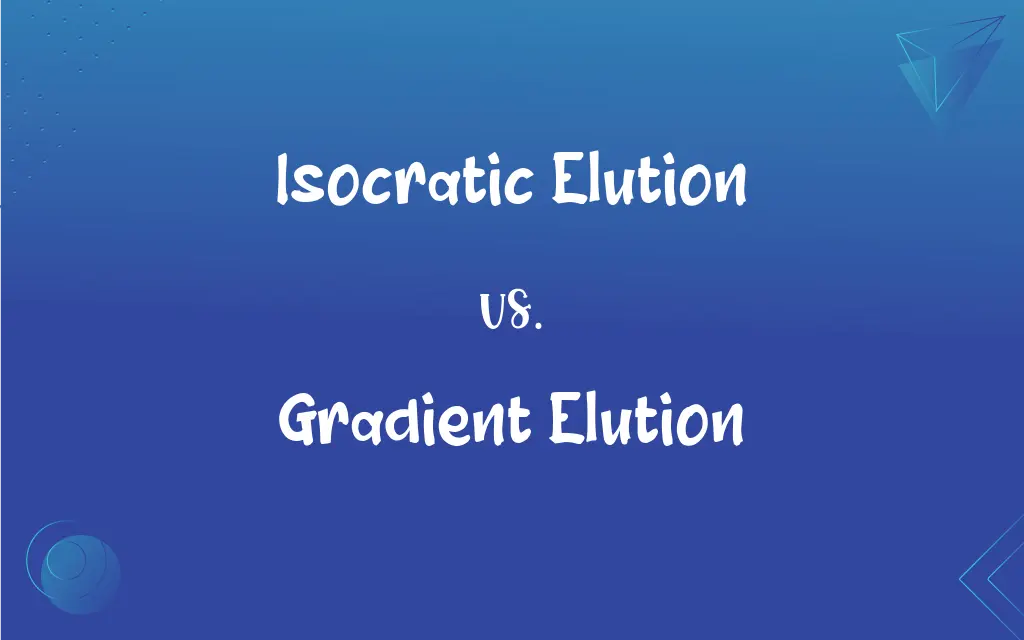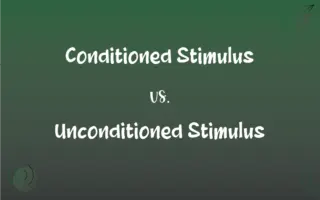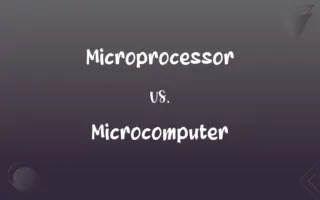Isocratic Elution vs. Gradient Elution: What's the Difference?
Edited by Aimie Carlson || By Janet White || Published on February 15, 2024
Isocratic elution uses a constant mobile phase composition, while gradient elution changes the mobile phase composition over time.

Key Differences
Isocratic elution maintains a consistent composition of the mobile phase throughout the process, ideal for separating compounds with similar characteristics. Gradient elution, however, gradually varies the mobile phase's composition, enhancing the separation of a wider range of compounds.
Isocratic elution is simpler and more straightforward, making it suitable for less complex samples. Gradient elution is more complex but offers greater versatility and efficiency in separating components in complex mixtures.
Isocratic elution often requires longer run times for complex mixtures, potentially leading to broader peaks. Gradient elution can provide faster analysis and sharper peaks, especially for samples with a wide range of polarities.
Isocratic elution systems are generally less complex and easier to maintain. Gradient elution systems, with their need for gradient pumps and mixers, are more complex and may require more maintenance.
Isocratic elution is often preferred in routine analysis where the sample composition is known. Gradient elution is favored in research and development settings where samples are diverse and complex.
ADVERTISEMENT
Comparison Chart
Mobile Phase
Constant composition throughout
Composition changes during the process
Complexity
Simpler and straightforward
More complex, suitable for diverse samples
Time Efficiency
Longer run times, potentially broader peaks
Faster, sharper peaks
Equipment Needs
Less complex equipment
Requires gradient pumps and mixers
Ideal Applications
Routine analysis, known samples
Research and diverse, complex samples
ADVERTISEMENT
Isocratic Elution and Gradient Elution Definitions
Isocratic Elution
Using a constant mobile phase composition.
The isocratic elution maintained the same solvent ratio throughout.
Gradient Elution
Improves separation of compounds with varying polarities.
The gradient elution effectively separated all components of the complex mixture.
Isocratic Elution
Ideal for separating compounds with similar polarities.
Isocratic elution was used for the sample with similar compounds.
Gradient Elution
Often faster than isocratic methods.
The gradient elution completed the separation in half the time.
Isocratic Elution
Common in routine analytical methods.
The laboratory used isocratic elution for daily tests.
Gradient Elution
Needs sophisticated chromatography systems.
Their lab upgraded to gradient elution systems for advanced studies.
Isocratic Elution
Results in predictable chromatographic profiles.
The isocratic elution provided consistent results.
Gradient Elution
Suitable for complex sample analysis.
Gradient elution was essential for analyzing the multifaceted sample.
Isocratic Elution
Requires simpler chromatography systems.
Their isocratic elution setup was less complex.
Gradient Elution
Gradual change in the mobile phase composition.
The gradient elution started with a high percentage of water, then increased the organic solvent.
FAQs
What are the advantages of gradient elution?
Gradient elution offers faster separation and better resolution for complex mixtures.
Can gradient elution separate a wide range of compounds?
Yes, it's effective for separating compounds with a wide range of polarities.
Does gradient elution require more advanced equipment?
Yes, it requires equipment capable of changing the mobile phase composition dynamically.
What is isocratic elution?
Isocratic elution is a chromatography technique using a mobile phase with a constant composition.
What does gradient elution mean?
Gradient elution is a method where the mobile phase composition changes during the chromatographic run.
Is isocratic elution more cost-effective?
Often, yes, due to simpler equipment and lower maintenance costs.
Is isocratic elution easier to set up than gradient elution?
Yes, isocratic systems are simpler and easier to set up.
Is isocratic elution more time-consuming?
It can be, especially for complex samples.
Can isocratic elution be used for quantitative analysis?
Yes, it's often used in quantitative methods for known compounds.
When should I use isocratic elution?
Isocratic elution is best for simpler samples or when the analytes have similar properties.
Can I switch from isocratic to gradient elution in the same analysis?
In some systems, yes, but it depends on the equipment capabilities.
Can gradient elution improve peak resolution?
Yes, it often provides better resolution between peaks.
Are there any drawbacks to using gradient elution?
It's more complex and may require more method development time.
Is isocratic elution suitable for new, unknown samples?
Generally, no. Gradient elution is better for unknown samples due to its broader separation capability.
How do I choose between isocratic and gradient elution?
Consider your sample complexity, separation needs, and equipment availability.
Can gradient elution handle high-throughput analysis?
Yes, it's often used in high-throughput settings for its efficiency.
What kind of samples are best for gradient elution?
Complex samples with components that have different polarities.
Is method development more challenging for gradient elution?
It can be, due to the need to optimize the gradient profile.
Are there any specific industries that prefer isocratic elution?
Industries with routine, standardized analyses often prefer isocratic elution.
Is maintenance more demanding for gradient systems?
Generally, yes, due to the more complex equipment.
About Author
Written by
Janet WhiteJanet White has been an esteemed writer and blogger for Difference Wiki. Holding a Master's degree in Science and Medical Journalism from the prestigious Boston University, she has consistently demonstrated her expertise and passion for her field. When she's not immersed in her work, Janet relishes her time exercising, delving into a good book, and cherishing moments with friends and family.
Edited by
Aimie CarlsonAimie Carlson, holding a master's degree in English literature, is a fervent English language enthusiast. She lends her writing talents to Difference Wiki, a prominent website that specializes in comparisons, offering readers insightful analyses that both captivate and inform.
































































